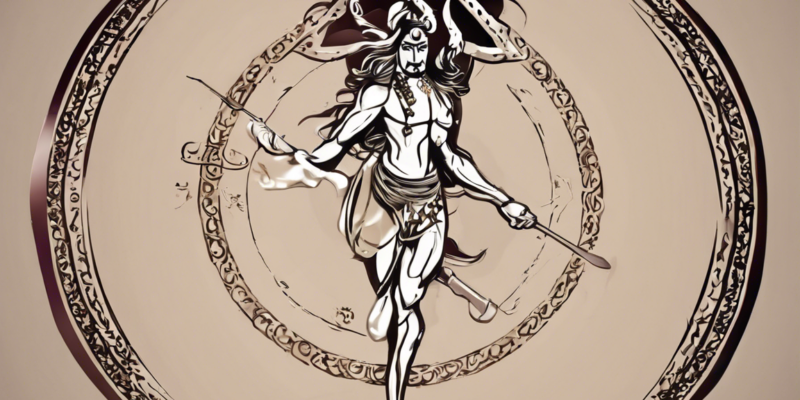
Exploring the 11 Powerful Names of Lord Shiva Rudra
Introduction:
Lord Shiva is one of the principal deities of Hinduism, known as the destroyer of evil and the transformer within the Trimurti, the Hindu trinity that includes Brahma and Vishnu. Lord Shiva is also known by the name Rudra, which means “the roarer” or “the howler.” Rudra represents the fierce and destructive aspect of Shiva, symbolizing storms, floods, and fire. The 11 powerful names associated with Lord Shiva Rudra hold significant spiritual and metaphysical meanings, offering devotees insights into his various attributes.
The 11 Names of Lord Shiva Rudra:
1. Bhava (भवा):
Bhava means “the one who becomes.” This name signifies Shiva as the source of all becoming, representing creation, existence, and dissolution.
2. Sarva (सर्वा):
Sarva means “all.” This name reflects Shiva’s all-encompassing nature, signifying his omnipresence and omnipotence.
3. Pashupati (पशुपति):
Pashupati translates to “the lord of all beings.” Shiva as Pashupati is the protector of all living creatures, guiding them towards spiritual liberation.
4. Ugra (उग्रा):
Ugra means “the fierce one.” This name emphasizes Shiva’s fierce and intense form, representing his power to destroy ignorance and negativity.
5. Bheema (भीमा):
Bheema translates to “the formidable one.” Shiva as Bheema symbolizes his awe-inspiring and formidable presence, instilling fearlessness in his devotees.
6. Shiva (शिवा):
Shiva means “the auspicious one.” This name signifies Shiva’s benevolent and gracious nature, bestowing blessings and prosperity upon his followers.
7. Maha Deva (महादेव):
Maha Deva translates to “the great god.” Shiva as Maha Deva embodies greatness and magnificence, symbolizing the supreme power of the cosmos.
8. Avyaktah (अव्यक्त):
Avyaktah means “the unmanifested one.” This name highlights Shiva’s transcendental and formless essence, beyond the confines of physical reality.
9. Pashupati (पशुपति):
Pashupati translates to “the lord of all souls.” Shiva as Pashupati governs the eternal cycle of life and death, guiding souls towards spiritual evolution.
10. Ishana (ईशान):
Ishana means “the supreme ruler.” Shiva as Ishana symbolizes his absolute authority and sovereignty over the universe, maintaining cosmic order.
11. Rudra (रुद्र):
Rudra translates to “the howler” or “the roarer.” This name depicts Shiva’s fierce and destructive aspect, representing his power to cleanse and purify through destruction.
Significance of the 11 Names of Rudra:
The 11 names of Lord Shiva Rudra collectively represent his various attributes and qualities, showcasing the duality of creation and destruction within the cosmic cycle. These names serve as mantras for devotees to invoke different aspects of Shiva for protection, guidance, and spiritual growth. By understanding and meditating upon these names, individuals can deepen their connection with Shiva and seek his divine blessings in their lives.
Frequently Asked Questions (FAQs) About Lord Shiva Rudra:
1. What is the significance of chanting the 11 names of Lord Shiva Rudra?
Chanting the 11 names of Lord Shiva Rudra is believed to invoke his different attributes and qualities, providing spiritual protection, blessings, and guidance to devotees.
2. How can one incorporate the chanting of the 11 names of Rudra in their daily prayers?
Devotees can incorporate the chanting of the 11 names of Rudra in their daily prayers by reciting them during their morning or evening rituals, meditation practices, or while performing puja to Lord Shiva.
3. What is the importance of understanding the meanings behind each name of Lord Shiva Rudra?
Understanding the meanings behind each name of Lord Shiva Rudra helps devotees connect with the specific attributes and essences of Shiva, enabling a deeper spiritual understanding and relationship with the divine.
4. Are there specific mantras associated with each of the 11 names of Rudra?
Yes, there are specific mantras associated with each of the 11 names of Rudra that devotees can chant for invoking the different aspects of Lord Shiva’s energies and blessings.
5. How can one experience the presence of Lord Shiva Rudra in their daily lives?
Devotees can experience the presence of Lord Shiva Rudra in their daily lives through regular prayers, meditation, acts of service, and by cultivating a sense of reverence and devotion towards Shiva in all aspects of life.
Conclusion:
Lord Shiva Rudra embodies the divine essence of creation, destruction, and transformation, symbolizing the eternal cycle of life and death. By exploring the 11 powerful names associated with Shiva Rudra, devotees can deepen their spiritual connection with the deity, seeking his guidance, protection, and blessings in their spiritual journey. Through understanding the meanings and significance of each name of Rudra, individuals can awaken the divine qualities of Shiva within themselves and experience the profound presence of the supreme consciousness in their lives.
